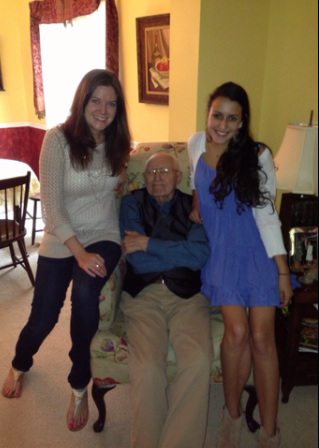
Check it out on YouTube on the link below
http://youtu.be/eDi2YOqHhCU
 I was happy to spend my Easter with family and friends. The picture to the left is my father-in-law, Erik Larsen. He is sitting between two of his granddaughters, Jennifer on the left and Megan on the right. Erik turned 92 about two weeks before Easter. He is in excellent health and serenaded us on the harmonica with his water-glass version of "My Country Tis of Thee." Check it out on YouTube on the link below http://youtu.be/eDi2YOqHhCU
0 Comments
I came across this article by John Blake on CNN several weeks ago and it brought tears to my eyes. He wrote about Antoinette Tuff and her courageous efforts to talk down a gunman who entered the school where she worked and threatened to kill everyone. His story is so well written that I didn't feel I could do it justice by summarizing it, so I have included most of it below.
Antoinette Tuff's knees tremble as she stares at the black barrel of an AK-47. Her hands shake so much she can't hold a pencil. Facing her, a stocky young man dressed in black points the assault rifle at her. "This is not a joke," the man shouts at Tuff. "I need you to understand this is not a joke. I am here. This is real. We are all going to die today." Tuff, a school bookkeeper, isn't supposed to be at work today. She's filling in for the front office receptionist as a favor. Now she is the only one standing between the gunman and 800 children at an elementary school just outside Atlanta. Tuff began her day by reading Psalms 23: "Yea, though I walk through the valley of the shadow of death, I will fear no evil." As she watches the gunman raise his rifle to fire, Tuff realizes she is no longer just sitting in a school. She is in the valley of death. Tuff was too terrified to speak when the gunman burst into the school, but what she said during the standoff that followed was credited with saving hundreds of lives. Tuff recounts the standoff in her new book, "Prepared for a Purpose," in which she attributes her actions to God. Yet Tuff's story can also be read as a survival guide for anyone who wonders what to do if they're suddenly facing someone with a gun. We asked survival experts to analyze Tuff's actions, and they freeze-framed three subtle moments in which her deft maneuvering increased her chances for survival. To Tuff, these actions seemed insignificant at the time. But they went beyond her celebrated ability to build empathy with the gunman by disclosing her personal struggles. Tuff instinctively took a series of actions that professionals who deal with violence take years to master, experts say. "She had a unique, deep and profound skill set that she was able to bring to the situation," says Kris Wilder, a 30-year veteran of the martial arts and author of "How to Win a Fight: A Guide to Avoiding and Surviving Violence." "She played her part perfectly." Tuff says today that she didn't have time to think -- she just reacted. But talk to her and it's easy to see why she connected with the gunman. She is a jovial, unpretentious woman with a husky laugh; after five minutes you feel like you're talking to your favorite aunt. Here are the three moments that show why Tuff was ready: Moment 1: She "changed the channel" Tuff watches as the gunman lowers the rifle and paces across the front office. He is a stocky man in his 20s with brown, cropped hair and a nose that looks like it's been broken. He is breathing heavily as he turns to Tuff and bellows: "Call 911 and call a news station. Tell them I'm going to start shooting." Tuff's shaking hand grips the phone as she dials 911. She quickly complies with everything the gunman asks, addressing him as "sir" as she relays his messages to the dispatcher. The minutes drag on, and the gunman shouts threats and waves his rifle at Tuff. Tuff takes a risk. She asks the gunman an odd question: "Can I go to the bathroom?" The gunman stops pacing. He turns in her direction. The angry expression on his face evaporates. Tuff's odd question "changed the channel," Wilder says. He and other survival experts say gunmen often whip themselves into a state of rage before they shoot people. They are literally no longer thinking straight -- the "lizard brain," or the brain's lower functions, are in control. They often refuse to make eye contact with their victims and back up when they are about to shoot. Tuff noticed that the gunman refused to make eye contact with her. Be wary when an angry gunman refuses to look at you, says Laurence Gonzales, author of "Deep Survival," a book that examines why some people are more resilient facing sudden life-threatening situations. "He's got himself into a fit of rage and he's trying to protect his emotional state," Gonzales says of Tuff's gunman. "He knows it's a very fragile state. If he doesn't make eye contact, he can keep that emotional state encapsulated." A potential victim can sometimes break that murderous mood with an out-of-the blue question that forces a gunman to think. "The guy is locked in and he's going to continue on his path unless there is something that changes the channel," Wilder says of the gunman Tuff faced. Tuff threw a . . . question at the gunman, but at the time she thought she made a terrible mistake. "It was almost ridiculous that in the middle of a violent standoff I asked the gunman if I could go to the bathroom," Tuff wrote in "Prepared for a Purpose," which was co-written by Alex Tresniowski. "If I had heard someone else did that I might have thought, 'How dumb can you be?' " But Tuff was actually being clever, Wilder says. Changing the mood can work in all sorts of potentially violent situations. Say you're facing a gunman who wants to rob you -- or worse, someone who is preparing to shoot you -- and your only chance might be to make a run for safety. Change the channel with an out-of-the-blue question like, "What time is it?" or a nonsensical question like, "What was Gandhi's batting average?" A question that shifts the gunman's thinking may save your life, Wilder says. Wilder says words are weapons, and he keeps a mental list of nonsensical questions -- Where did you buy that shirt? Did you get Lasik surgery? -- that he can fire off at a moment's notice. Moment 2: She anchored herself Tuff's legs wobble as she rises to go to the bathroom. But before she can take another step, an awful thought comes to her: If I go to the bathroom, the gunman might follow and I will inadvertently lead him to the classrooms where the children are hiding. By now Tuff knows the whole school has been warned over the school intercom that there is an intruder in the building. The teachers are keeping the children hidden in the classrooms. Tuff watches as the gunman takes a plastic chair from the office and uses it to prop open the school's main door. He raises his rifle and begins shooting at police, who by now have gathered outside. Glass shatters and bullet casings scatter across the office. But for some reason, a blanket of calm settles over Tuff. She watches the gunman fire away, but doesn't move from her seat. Tuff takes another chance. "Sweetheart, come back in here," she tells the gunman. "Bullets don't have no names. And those bullets gonna kill me and you. I need you to come back in here and it's gonna be you and me and we will work this thing out." Press accounts of the standoff made much of Tuff's ability to empathize with the gunman. She called him "sweetheart," told him about her marital problems, and revealed that she had once contemplated suicide. Tuff's book reveals that her struggles went even deeper. She says she moved 14 times in one year as a child, was homeless at one point and contemplated suicide on four occasions. But here's the thing about empathy: It matters little if you're not calm enough to employ it during a life-threatening situation, survival experts say. Tuff and the entire school staff had received some training for dealing with dangerous situations involving trespassers. But it was life's hardships that had conditioned her like a soldier. She automatically calmed down when faced with an extreme situation. She had been trained to do so by her own struggles, as well as by her faith. Tuff calls it "anchoring." It's the spiritual practice she incorporated into her life that she says helped her during the standoff. She goes to sleep every night with an audiobook of the Bible playing softly by her bed to instill a sense of peace. At 5 each morning she listens to gospel songs, talks out loud to God and reads the Bible. She ends her anchoring practice by sitting in silence for 15 minutes, waiting to hear God. "Trust me, sitting for 15 minutes isn't as easy as it sounds," she says in "Prepared for a Purpose." "I could sit and watch a TV show for an hour, but listening for the Lord for 15 minutes was a challenge. I had to work on it. I had to practice." Tuff wasn't just a receptionist when the gunman entered the office. She was like a finely tuned spiritual athlete. She was ready. That's what quick-thinking people who survive life-threatening situations often do: They practice calmness before their crisis, says Gonzales, author of "Deep Survival." You don't have to open the Bible to practice calmness; you can do it during rush hour, he says. "You have to practice emotional calm in your everyday life to have it in an emergency," Gonzales says. "Look at your emotional responses to everyday things: If you're stuck in traffic, are you pounding the steering wheel or do you turn on classical music and relax?" Tuff's calmness -- not just her empathy -- helped her connect with the gunman because emotions are like viruses; what you feel can be transmitted to others, he says. "If you're with someone who is lighthearted and happy, you're going to feel the same emotions," he says. "She transmitted these feelings from her own deep beliefs and sincerity, and he caught this emotional message from her. It completely disabled him." Tuff didn't know she was so poised during the standoff. "I thought I was screaming," she says today. "I didn't realize how calm I was. I went back to listen to the (911) tape and it was like I didn't even recognize who I was. I could not repeat what I said if you asked me. I had no idea what I was saying. I know it was God." Moment 3: She evoked the motherhood mystique The gunman obeys Tuff's commands and wobbles back into the office. He slumps in a chair. He's bleeding from his elbow; he cut himself while shooting at the police. "I feel so badly about my life," the gunman says softly. He tells her he is off of his medication for a mental disorder; that he should have gone to the hospital. "Well don't feel bad baby," Tuff says. "My husband just left me after 33 years. I mean I'm sitting here with you and talking about it." Tuff tells the gunman she can let police know that he didn't harm her. She offers to walk outside with him so they won't harm him. They talk more, and she negotiates his surrender with the 911 dispatcher as the gunman lies on the floor and places his rifle on a counter. "I really messed up," the gunman tells Tuff as he waits for the police to enter the office. "It's going to be all right sweetie," Tuff tells him. "I just want you to know I love you, OK, and I am proud of you. That's a good thing you've given up, and don't worry about it. We all go through something in life." It's a peculiar pattern you read about in books on war. When soldiers are dying on the battlefield, some of them will cry out for their mother with their last breath. The mother is a figure of immense primordial power for men, and Tuff used that to her advantage, Wilder says. Listen to the 911 tape to see how she managed the transition. At the beginning of the tape, she is not the mother. She is a soldier obeying a superior officer, barking out his orders to the 911 dispatcher. By the end of the call, though, she is cooing "sweetie" and "baby" to the gunman as if she is a proud mother. Tuff is indeed the mother of two grown children. In much of her book, she talks about the way she pushed her son, who is disabled, to care for himself as much as possible, and encouraged her daughter to excel in school. The tough, nurturing habits of a concerned mother pervade her being. Becoming a maternal figure to the gunman helped save Tuff's life, Wilder says. Up until age 7, mothers are the provider of everything to boys, Wilder says. A gunman pumped up on adrenaline and anger is often functioning at the mental state of a young boy -- they see the world through simple emotions like hate and fear. A woman who can appear as a maternal figure to a gunman in such a frenzied state can reach him in a way no others can, says Wilder, who also owns and teaches at the West Seattle Karate Academy in Washington state. "She had life experience," Wilder says. "She was coming from that mother archetype. That would not have worked if she was a first-year teacher out of Missouri State." Tuff's standoff ended when she negotiated the gunman's surrender with police. No one was hurt. She says it was no accident that she was in the front office that day. "I know that every last thing I've gone through, from childhood up to the end, prepared me to save that young man and all of those students," she says. Still, there's a harsh truth that cannot go unmentioned in stories similar to Tuff's. An extraordinary person like Tuff can do everything right in such a situation and still get killed, says Gonzales, author of "Deep Survival." He cited the Columbine shootings, where, apocryphal or not, one victim of the notorious Colorado high school massacre was said to have evoked her Christian faith before she was killed by one of the teenage gunmen. "She could have easily done what she did and got herself killed," Gonzales says of Tuff. "She was very lucky in addition to being very brave." Luck, it has been said, is the residue of skill. And Tuff's skill offers a lesson for others who may wonder how they would react in a similar situation. Tuff was a shape-shifter during her faceoff with the gunman. She started off as his victim, then turned herself into his messenger, confidant, protector and mother before reverting to what she was all along: A survivor. A wonderful story of bravery in the face of adversity. I found it fascinating that this woman was not angry with the gunman, instead she empathized with him. If you go to the website below you will see the whole story and video, as well as many comments. Some comments are positive and some are negative. The negative ones seem to be from angry people who would have lashed out at the gunman and killed him if given the chance, because as one commenter said, "If she'd been armed she could have achieved the same outcome in five seconds and we wouldn't have to pay for the nutcase to be 'treated' for the rest of his life." Fortunately she didn't do what this person suggests and it absolutely would have not achieved the same outcome for her or the gunman. I find it offensive that this person put the words 'treated' in quotation marks, as if treating mental illness is not real medical treatment, where have they been living? Mental illness is just an illness in need of a treatment! http://www.cnn.com/2014/02/22/us/tuff-survivor-gunman/index.html
 After writing yesterday's post about raising your children, I thought about the difficult times I have had in the past with my offspring. No parent can say rearing their child was or is easy, but there are good times and bad times. My good times were when my kids were young, under the age of eleven. They were easy babies, easy toddlers, did not have tantrums, and could be taken just about anywhere without any fuss. Then came adolescence. At this time they changed, or I changed, or the world changed. No longer did I have cuddles or was told "I love you more than anything." Somehow that lovey-dovey relationship turned, seemingly overnight, into an unrecognizable opposition. "Few of us are aware of how close we are with our children until we lose them to adolescence. We really have no idea how much we have come to place our own need for nurturing and love in the hands of our kids until they shred it up and throw it in our faces."--Dr. Michael Bradley. What is this emotion we as parents feel when our child seems to hate us? Grief. Bradley says, "The grief these parents feel for the loss of their child is profound and relentless in that the loss seems renewed daily. Each day dawns with renewed parental hope that the old Junior will reappear. Each evening seems to end with the echoes of the day's battles fading into night along with their dreams of getting their child back." Then when you didn't think it could get any worse, the rage starts. I have read Dr. Bradley's book Yes, Your Teen Is Crazy! and I have been fortunate not to have experienced the type of rage he describes in Chapter 13, but I have danced around the edge. "In the face of true rage from your kid (or just a regular old argument too), the first thing to do is decide not to do all those things that feel so right to you in the moment, like screaming back, tearfully pleading, or punching her lights out. The second thing to do is switch your control center from your heart to your head: Become that dispassionate cop. . .As your kid starts screaming, talk more quietly, and with very few words in very short sentences. Let your child hear her own out-of-control voice echoing off the walls. Don't let her off the hook by screaming back. This only allows her to focus on your craziness instead of hers, and it makes her behavior seem normal in comparison with yours. Confront her with the insanity of her own behavior by isolating and contrasting it with your own quiet responses."--Dr. Michael Bradley. This is way easier said than done and takes a lot of practices and failures to get it right. And I will bravely tell you that I have had many failures in this department. Even when I thought I had mastered it, I would fail miserably at a later date, so keep trying, trying, trying. Dr. Bradley outlines the 10 Commandments of parenting your teen in Chapter 9: I: Thou Shalt Be as the Dispassionate Cop Unto Thine Own Child: Be Cool, Not the Fool II: Thou Shalt Listen Even as Thine Own Child Shouts III: Thou Shalt Not Shout: Speak Thou Wisely IV: Thou Shalt Add 15 Minutes to Every Interaction Involving Thy Teen V: Thou Shalt Vanquish Thy Foolish Pride VI: Thou Shalt Not Kill (Thou May Entertaineth Thoughts of Killing, But. . .) VII: Thou Shalt Apologize at Every Opportunity VIII: Thou Shalt Honor Thy Child's Identity (Even Though It Maketh You Ill) IX: To Thine Own Self Be True X: Know Thou, This Too Shall Pass One of Dr. Bradley's colleagues says, "Adolescents are psychosis carriers: Contact with them can make you crazy. There's more truth than humor there as far as parents are concerned, for those difficult times with a teenager can slowly tear at the fabric of the parents' self-concept, causing them to begin to doubt their own worth and competence. We all joke a lot about adolescent acting-out behaviors, but we forget that somewhere a mom and dad are desperately soul-searching and self-blaming as they watch their beloved child act crazy." I have been there many times, desperately soul-searching and self-blaming my parenting skills. What did I do wrong? What could I have done better? Where do we go from here?  If parents can take a moment and remember what it was like to be a teenager, maybe we could understand what she or he is going through. Your adolescent is struggling with out-of-control emotions, hormonal surges, and defiant behavior impulses. Remember the prefrontal cortex? The part of the brain responsible for problem solving, emotion, complex thought, expression of personality, impulse restraint, and appropriate social behavior. Well it isn't fully developed until the mid-20's, so don't hold your breath, because there is a long road ahead. Don't give up. You can have a good, even great, relationship with your teenager, it just takes hard work and self-control. . . oh yeah, and the occasional glass of wine. http://themetzfamilyadventures.blogspot.com/2013_10_01_archive.html (the blog on "My kids are not the center of my world," is October 25, 2013)
I read the above blog by a woman last week on Facebook and was thrilled by her choice of parenting. It is refreshing to see a young mother raising her boys to be independent and self-reliant. She also said, “My kids are NOT the center of my world, and that’s quite simply because they aren’t the center of any world, anywhere.” I did my best to raise my children the same way and hope more parents take this advice to heart. Stephanie Metz does not proclaim to be an expert and have all the answers, but she is working every day to raise her children the best way she can. I re-posted some of my blog from January 24 below about this topic. Please check out Stephanie Metz's blog above. If you have never been hated by your child you have never been a parent. -- Bette Davis I love this quote by Bette Davis. We can't be our child's friend and also be their parent. They won't always like us. There was a terrific article by Kathy Caprino in Forbes magazine last week about parenting. She said, "As a parent myself, I’ve learned that all the wisdom and love in the world doesn’t necessarily protect you from parenting in ways that hold your children back from thriving, gaining independence and becoming the leaders they have the potential to be." She interviewed leadership expert Dr. Tim Elmore to "learn more about how we as parents are failing our children today — coddling and crippling them — and keeping them from becoming leaders they are destined to be." "Care enough to train them, not merely treat them to a good life. Coach them, more than coddle. “--Dr. Elmore http://www.forbes.com/sites/kathycaprino/2014/01/16/7-crippling-parenting-behaviors-that-keep-children-from-growing-into-leaders/
To watch Jon Stewart's interview with Malala Yousafzai click on the link below
http://www.upworthy.com/watch-this-incredible-young-woman-render-jon-stewart-speechless?g=3&c=ufb4 Diane Sawyer relays a short documentary about Malala Yousafzai in the link below https://www.youtube.com/watch?v=ev-jPT5M9cU (Diane Sawyer interview with Malala Yousafzai)  I have not written about my synchronicity moments recently because I haven't had any. I was very in-tune with them for a while and had one or two a week, but I must be out of synch now. Instead of describing a recent synchronicity moment I will relate one from my college days. I went to Florida State University and worked various jobs throughout college to help my parents with the expenses. This particular year I was working at a video store, you know those places they used to have where you could rent a video, watch it, bring it back and get another. My roommate talked me into rushing as a little sister at a fraternity, yes I did say fraternity, this was before most universities disbanded the little sister program. The fraternity accepted me and on the night of the initiation I was supposed to work at the video store. I didn't want to miss the initiation party, so I switched nights with another girl who worked at the store. I went to my party. The following evening I arrived for work and was surprised to see a male employee on the schedule too. It was unusual to have two people working late in the evening. He asked if I had heard what happened the night before. I told him I had not. He said two men had come into the store and held the girl who took my scheduled time at gun point and robbed the store. The men ordered the girl to run out of the store and down the road, without looking back. She got away safely after falling and skinning her knees. I remember thinking, that could have been me. I don't know if anything different would have happened if I had been at the store instead of that girl, but I am glad I did not have to find out. After this incident the female employees were not aloud to work alone at night in the video store. I would love to hear your synchronicity moments. The actress, Glenn Close, has spoken about mental illness in her own family and the launch of her nonprofit organization, Bring Change 2 Mind, that is geared toward helping raise awareness about mental illness as well as providing information and support to people with mental illness. In an article written by Close for the Huffington Post, titled Mental Illness: The Stigma of Silence, she says, "It is an odd paradox that a society, which can now speak openly and unabashedly about topics that were once unspeakable, still remains largely silent when it comes to mental illness. What mental health needs is more sunlight, more candor, more unashamed conversation about illnesses that affect not only individuals, but their families as well. Our society ought to understand that many people with mental illness, given the right treatment, can be full participants in our society." The final message in the Huffington Post article is a powerful one. "The World Health Organization (WHO) estimates that by the year 2020 mental illness will be the second leading cause of death and disability. Every society will have to confront the issue. The question is, will we face it with open honesty or silence?" Will you be silent? Watch the abc news video of Glenn Close by following the link below http://abcnews.go.com/Health/video/glenn-close-star-power-urge-passing-mental-health-21267798 Check out the wonderful website and organization launched by Glenn Close and her sister, Jessie.
http://bringchange2mind.org/  "To understand your parents' love, you must first raise children yourself."--Chinese proverb I wanted to give everyone an update on how my son is doing. After many trials and tribulations and a great amount of "tough love" on our part, he has found a good job and life is moving in a more positive and productive direction. I know that there will continue to be ups and downs in the future, but I am going to be grateful for what I have in this moment and try not to worry about what the future might bring. |
Archives
January 2019
Click on the RSS Feed link above to follow my blog
|